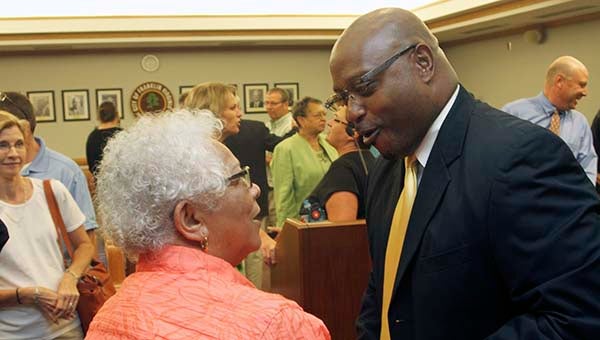Franklin schools could face shortfall
Published 10:17 am Friday, February 27, 2015

Superintendent Willie Bell, right, talking to councilwoman Mary Hilliard when he was introduced. Bell now has the challenge of convincing Franklin City Council to help fund the school system’s projected budget shortfall. — FILE
FRANKLIN
The Franklin City Public School division is projecting to lose more than $300,000 in revenue from the Virginia General Assembly. With federal revenue expected to remain flat and other sources decreasing by more than $78,000, the schools might have to look locally to make up the gap or to further tighten their belt, said members of the school board.
Superintendent Willie J. Bell said health insurance has been increasing every year and 2015-16 will be no different, with costs going up by more than $27,000. The E-Rate program, which helps schools pay for telecommunications and Internet access, will also require a larger local match of $28,553, while decreasing what it contributes by $50,000.
The biggest reduction will come from the state and is due to a declining enrollment. Over the past decade, enrollment has decreased and that trend will continue in 2015, where the state is projecting the division to lose 88 students, said Bell.
There are potential solutions, such as eliminating travel and use of division vehicles, decreasing health insurance selections, a reduction to departmental accounts and reduction to school allocations.
All things being equal, to continue without reductions will cost an estimated $645,843, he said.
There are other factors that need to be considered for the next budget cycle, such as raises.
“I understand that money is tight everywhere, but our teachers deserve to be paid comparable to what they can make elsewhere within a 40-mile radius,” said board vice chairman Will Councill. “We have to work very hard on that.”
Bell said he would have a presentation on this topic that he was preparing for city council, but he added that the raise would help them catch up to Isle of Wight County, Suffolk and Surry County. The superintendent said that after the five-year mark, these are the communities where the system loses the most teachers to, and the raise would help close the gap on salaries in the six-year to 20-year time frame.
To give the requested 5 percent raise, however, would cost the city an estimated $526,526. Other requests on the table are the J.P. King Middle School athletics program at $125,000, which would support basketball, volleyball, track and football. The division is also seeking to add some more positions, such as Spanish and business teachers for the elementary- and middle-school level, and a culinary arts teacher. Each of these would pay $55,000.
Bell said right now it’s still early in the process and that his recommended budget is a working document. He invites community members to the March 10 public hearing, which will be in Council Chambers in City Hall at 6 p.m., so that they can give feedback on what they’d like to see from the schools.
Bell said they are also still debating what to do with the carryover. Traditionally, the schools would attempt to carry over some of its allocation from the Franklin City Council to help with anticipated costs for the next year. He has expressed dissatisfaction with that system in the past, but he has not ruled out keeping some if possible. Current projected budget figures include spending everything in 2015-16 that the system would normally earmark as carryover.
Bell has already asked for and received some of the carryover he was set to receive for the 2015-16 year. This way he could meet expenses this year with the Corrective Action Plan, which is on the Virginia Board of Education’s agenda for Feb. 26.
Ward 3’s Andrea Hall-Leonard didn’t wish to speak on the budget, and Chair Edna King could not be reached for comment.
Ward 2’s Nancy Godwin said she hoped to see the public there on March 10. She also hoped that they would be able to convince the public of the need for more funding for the schools.
“I would just encourage the public that if they would like the city to support the schools more, to give their council person a call and tell them what they think,” Godwin said. “I think teacher raises are very important for us to be competitive with the school systems around us.”





